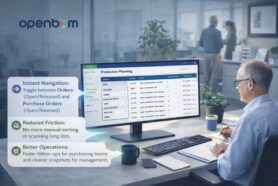
As a startup, one of the most daunting tasks you need to figure out is your supply chain strategy. The first step is usually figuring out whether you will source all the parts yourself and assemble them in-house or hire a contract manufacturer to control your supply chain.
In today’s post, we will look at why a startup should work with a contract manufacturer (CM) and how a startup should go about working with one for the first time.
What is Contract Manufacturing?
Before diving in, let’s take a few steps back and learn more about contract manufacturing. Contract manufacturing is a type of outsourcing in which a hiring company (the manufacturer) enters into an agreement with a supplier to make their product.
CMs are utilized by companies of all sizes. The most common example is how Apple hires Foxconn to assemble its products. The alternative would be Apple investing in their production lines which they don’t do because Apple’s competitive advantage is not production.
CMs are also not just for the fortune 500. There are CMs out there for companies of all sizes, even for startups. While some CMs associate risk with startups and steer away, others see an opportunity to work with startups as it can lead to long-term success and great financial returns.
The Benefits of Contract Manufacturing for a Startup
Most startups are on a tight budget and they need to allocate resources to launch their product successfully. When developing their supply chain strategy, there are two ways most companies proceed. The first is by hiring a CM that acts as a turnkey supplier. While the second option is sourcing each individual component themselves and assembling their product in-house. There are a few other approaches and a hybrid option, but these are the two most popular options.
While some startups don’t like to provide a CM with their product data and IP, most prefer to work with a CM. The sole reason for this is that the CM becomes their manufacturing partner. Here are reasons why a startup can benefit from working with a CM.
Resource Management
Most manufacturers don’t have an unlimited budget, especially startups. Startups need to allocate their resources and budget wisely. This usually means taking responsibility for tasks they can drive efficiently, such as engineering and sales. The areas in which you don’t have an advantage, such as production, are outsourced to a company that can help you.
Skill Sets
Assembling in-house and sourcing all the parts yourself means you need to hire additional workers. These are both skilled and unskilled workers that you need to hire, train and keep busy. Working with a CM will take this responsibility away from you. Your CM will be responsible for all of this. You just need to bring the orders.
Cost Effective
Working with a CM is cost-effective in a few different ways. The first way is that you don’t need to invest in your own facility. This also leads to increased operating costs of running the facility, paying salaries, maintenance of the machines, and more. Working with a CM is cost-effective because they should be able to fabricate parts cheaper than you can. Meaning that the CM should be able to provide a cost cheaper than if you source all the parts and assemble the product by yourself.
Leverage their DFM/Engineering Team
Another important reason a startup works with a CM is so the startup can leverage the CMs engineering team. The startup will utilize the CM’s engineering team to support design for manufacturing (DFM). The CM will be able to take the product you have and transition it for production.
Speed to Market
If you hire a CM then you have a headstart already. You can utilize their machines, supply chain, labor, and more. If you choose to assemble the product yourself then you’ll need to do all of this yourself which extends your launch date.
Quality
One of the main reasons you will go with a CM is so you can take advantage of its high quality. When evaluating a CM you’ll see which other products they manufacture. You will end up making a decision to work with a supplier based on a list of requirements and criteria. One of those will be the quality of their work. Also, the CM will have the necessary quality standards and equipment necessary for your product. Yet another cost you do not need to invest in.
How a Startup Should Evaluate its CM
During the pandemic, it was a bit difficult for startups to evaluate suppliers because it was difficult for them to fly to China. However, since China has lifted the mandatory quarantine for foreigners makes it is much easier to fly to China to fully evaluate a few CMs.
There are a few steps you need to take to fully evaluate your CM. Here are the steps:
- A Virtual Supplier Evaluation
- Request for Quotation (RFQ)
- Sampling
- Factory Visit
For the evaluation, it’s not very important to look at where you will be in 5 years. It’s more important to know where you are now. The key question you need to answer is whether the CM you are speaking with is able to help bring your product to market and can scale up production.
How to Share Data with your CM for the First Time?
Sharing data with your CM for the first time can be a bit intimidating. You are sharing sensitive information you have been working on for the past year or more with someone who you have just started working with. However, if you do want to bring your product to market then you will need to understand how to share data with your CM.
Here is what you will need to share with your CM in order for them to get started:
- Bill of Materials (BOM)
- CAD Drawings
- Part Specifications
- Quality Requirments
- Assembly Instructions
As you can tell, this creates a lot of files and folders that you and your CM need to keep track of. Poorly organizing your product data will lead to the following:
- Working with old data
- Purchasing the wrong parts with the wrong specifications for prototypes
- Tedious back and forth for the most up-to-date part drawing.
Companies are overcoming this by creating a single source of truth that their CM has access to. Startups no longer need to collect all their product data and dump it into their CMs email. Startups can now leverage tools to improve collaboration which brings their colleagues, suppliers, and contractors into a single platform.
How to Start your Journey Today?
If you are a startup and looking to gain a competitive advantage by working with a contract manufacturer then you should also start your digital transformation journey. Digital transformation will keep all of your product data together and manage your revisions and create an ECR/ECO process. Your solution is a centralized platform that connects your team, contractors, and suppliers.
OpenBOM is a cloud-based PDM & PLM platform to manage your engineering and manufacturing data. Companies from startups to Fortune 500’s use OpenBOM to create a centralized database to bring in, store and manage their manufacturing data. With this infrastructure, users also use OpenBOM to streamline both their change management and PO processes.
If you need to improve the way you manage your data and processes, share data instantly, or to collaborate with contractors and suppliers, contact us today for a free consultation.
Regards,
Jared Haw
Join our newsletter to receive a weekly portion of news, articles, and tips about OpenBOM and our community.










